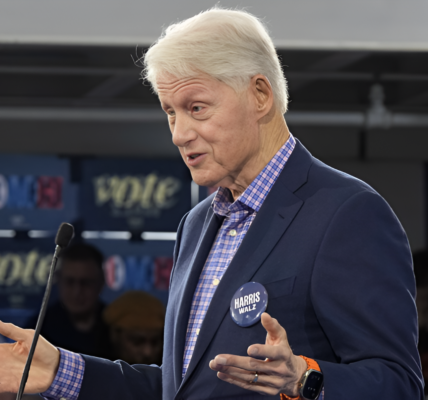
With the 2024 election approaching, the battle for male voters has heated up. While young women are largely expected to support the Democrats, young men remain an unpredictable demographic, with some polls even showing double-digit support for the Trump-Vance ticket.
Ironically, what was expected to be an election focused on women’s rights, particularly abortion, may ultimately hinge on the votes of young men. Republicans have consistently worked to win over this group, using a range of strategies that include appealing to their interests. From promoting pro-male messaging through figures like Dana White, president of UFC, and iconic moments like Hulk Hogan at the RNC, to hosting podcasts and targeting college football games, the GOP has been anything but subtle.
In contrast, the Democrats are now scrambling to appeal to men, with Kamala Harris launching an “opportunity agenda” for Black men, which includes supporting entrepreneurs, regulating cryptocurrency, and recruiting more male teachers. Rumor has it she may also make an appearance on Joe Rogan’s podcast—one of the most popular platforms among young men. But with the election looming, one must ask: Is it too little, too late?
Despite the challenge, there is a political opportunity for Democrats to craft a strong pro-male policy platform, as Republicans have largely only signaled a pro-male stance without meaningful policy to back it up. The Democrats, on the other hand, already have policies in place that could easily be packaged as pro-male. They simply need to take the leap.
The Real Issue: Men’s Concerns are Being Ignored
Contrary to some progressive narratives, young men aren’t becoming a generation of misogynists. In fact, support for gender equality among men under 30 continues to rise. The issue lies more in the fact that men often feel their problems are not being acknowledged by the political left. While women’s issues are well-represented in the Democratic agenda, men are notably absent. The platform lists groups like women, but not men, and the White House’s new Gender Policy Council hasn’t yet addressed a single issue affecting boys or men.
This oversight is costly. Issues affecting men—especially working-class men and men of color—are real and pressing. But they’ve been largely ignored, leaving a vacuum filled by reactionary voices from the “manosphere.” When problems go unaddressed, they fester into grievances that can be weaponized for political gain.
Gender Equality Doesn’t Have to Be Zero-Sum
The mistake both sides are making is treating gender equality as a zero-sum game: Helping men means doing less for women. This isn’t true. Women still face significant barriers, but advocating for men doesn’t negate the need for progress on issues facing women. In fact, many progressive young women are concerned about their brothers’ mental health or their husbands’ job prospects. A society cannot truly flourish if one gender is left behind.
Addressing men’s issues doesn’t mean disregarding women’s needs. It’s about creating a comprehensive agenda that works for everyone, especially in the areas of education, health, and family life.
Policy Solutions: Where Democrats Can Start
Here’s where Democrats can begin crafting a policy agenda for men that could also resonate with voters:
- Education
Boys and men are falling behind in education. In many districts, boys lag a grade level behind in literacy. College enrollment has remained stagnant since 1984, and men are outnumbered two-to-one on college campuses. Policies such as recruiting more male teachers, offering flexible school starting ages, and expanding career and technical education (CTE) programs can make a big difference. - Health
Men’s health, especially mental health, is too often overlooked. Rates of substance abuse and suicide are disproportionately high among men. Establishing a Male Suicide Prevention Task Force, creating an Office of Men’s Health, and improving coverage for male contraception are all essential steps toward addressing these issues. - Family Life
Many men, especially working-class and Black men, face challenges in maintaining a strong connection to family life. Policies such as equal, independent paid parental leave, reforms to family law for unmarried fathers, and a Nonresident Parent Tax Credit would go a long way toward helping men engage more fully in family life.
A Way Forward
It’s not too late for Democrats to articulate a policy agenda that supports both men and women, creating a more inclusive approach to gender equality. As Kamala Harris has said, she needs to earn every vote—including those of men. By addressing the challenges men face in education, health, and family life, the Democrats could send a strong message: “We see you, we recognize your struggles, and we have concrete plans to help.”
There’s still time for both parties to show that they care equally about the flourishing of all people, regardless of gender. The question is, who will rise to the occasion?





